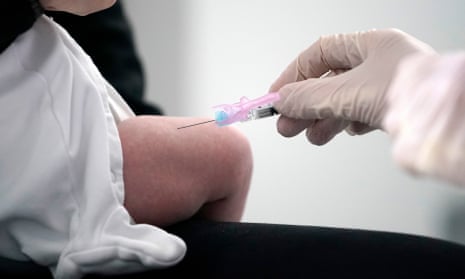Senior doctors fear that thousands of routine vaccination appointments may be missed or delayed because of the coronavirus lockdown, raising the risk of sudden and potentially fatal outbreaks of other diseases when restrictions on movement are finally eased.
GPs and accident and emergency departments have witnessed unprecedented falls in the numbers of people seeking medical care in recent weeks, prompting concerns that vital routine immunisations for infections such as measles, mumps, rubella, tetanus and whooping cough are falling by the wayside.
“We are very concerned. There are no data yet because we have only been in lockdown for a month, but there are plenty of anecdotes from practice nurses and others saying they have noticed a decline in vaccine uptake,” said Helen Bedford, a professor of children’s health at the UCL Great Ormond Street Institute of Child Health and member of the Royal College of Paediatrics and Child Health’s health promotion committee.
Similar worries have been borne out in the US, where health records released this week showed MMR (mumps, measles and rubella) shots were down 50% in the week of 5 April, with diphtheria and whooping cough immunisations down 42%.
“We’re concerned this is going to have a major impact on immunisations here and also on the routine health checks that new babies have, because people are afraid to go to their general practice or fear general practice isn’t open for business, and it very clearly is,” Bedford said.
Ministers and their expert advisers have repeatedly stressed the need for people to stay at home and save lives, but doctors are worried that those who need vaccinations are missing or deferring appointments for fear of either contracting the virus when they go out or adding to the burden on healthcare workers.
In mid-March, many GP practices closed their doors and switched to telephone consultations with only a small number of patients receiving face-to-face examinations. Doctors have since reported fewer people coming forward with routine health issues and even potentially serious problems, such as cancer symptoms and poorly controlled diabetes and heart disease.
“Childhood immunisations and immunisations for vulnerable older people and people with multiple health problems are an absolute priority for us,” said Prof Martin Marshall, the chair of the Royal College of General Practitioners.
“Children can become very ill and die from the complications of common illnesses like measles that haven’t gone away. And immunisation is a fundamentally important part of preventing that from happening. We cannot allow delays in immunisations to go on for a long time, otherwise we really will see a crisis,” he added.
In a letter to the Guardian, Marshall warned that it was “essential” for parents to get their children immunised during the Covid-19 epidemic and that a slump in vaccinations risked outbreaks of whooping cough, measles, mumps and rubella in the future.
Doctors are particularly worried about children skipping the measles vaccination. Measles is roughly six times more infectious that Covid-19 and can be fatal in some cases. Last year, the UK lost its measles-free status because of a fall in MMR immunisation, meaning that some parts of the country, such as London, are already at high risk of outbreaks.
“Measles is massively more infectious than Covid-19 and because it’s so infectious, you only need a small decline in vaccine uptake to start seeing outbreaks,” Bedford said. “The pandemic doesn’t make all the normal diseases go away. They are still circulating, but while we are all in our homes we are protected to a certain extent. It’s when we re-emerge that there is the potential for problems.”
She urged new parents to ask their GPs to combine immunisation appointments with routine checks on the mother and baby so that they only need to visit the doctor’s surgery once.
The lockdown is having a disproportionate impact on the ability of poorer people to get to appointments, while populations that already have low vaccination rates are expected to become even more vulnerable as their uptake drops further.
“The important thing will be finding ways for children to catch up. There will have to be a catch-up process and that might be quite complicated,” Bedford added.
Dr Mary Ramsay, the head of immunisations at Public Health England, said: “The national immunisation programme is highly successful in preventing serious and sometimes life-threatening diseases, such as pneumonia, meningitis, whooping cough, diphtheria and measles. During this time, it is important to maintain the best possible vaccine uptake to prevent a resurgence of these infections.”
“A vaccine will hopefully conquer Covid-19 and ultimately save lives,” Marshall added. “It would be tragic if a consequence of this pandemic is that we see outbreaks of other deadly diseases for which vaccines already exist.”
